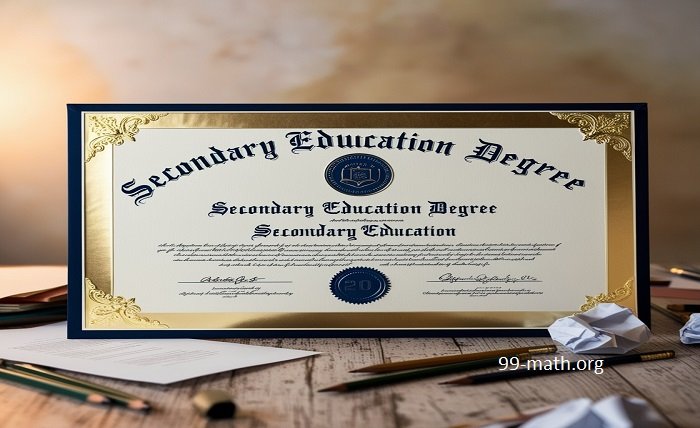Introduction
Young people’s futures are greatly shaped by their secondary education degree, which equips them for further study, employment, and civic engagement. Those who want to become teachers in middle and high schools can acquire the skills, information, and competences required by earning a degree in secondary education. A secondary education degree can be your ticket to a rewarding career in teaching, regardless of your subject-matter interest or commitment to influence the future generation.
What is a Secondary Education Degree?
Depending on the educational system, a secondary education degree qualifies a person to teach students in grades 6 through 12. This degree usually includes training in pedagogy, classroom management, and adolescent psychology and concentrates on a particular subject area, like math, physics, English, or social studies. Providing aspiring teachers with the resources they need to design successful lesson plans, oversee diverse classes, and evaluate student learning is the aim of a secondary education degree.
The Importance of a Secondary Education Degree
A student’s secondary education is a crucial stage in their academic career since it gets them ready for both the workforce and further education. These educators have a significant impact on how pupils develop socially, emotionally, and intellectually. Having a secondary education degree guarantees that teachers are prepared for the challenges of working with teenagers, who are going through a critical period of both academic and personal development. A comprehensive secondary education degree program also promotes a thorough comprehension of the subject, which is necessary for competent instruction.
Pathways to a Secondary Education Degree
A secondary education degree can be obtained through a variety of routes, each of which accommodates a range of educational backgrounds and employment objectives. The most common path is a four-year bachelor’s degree program, in which students take courses in general education, specialty subjects, and teaching practicums as part of a broad curriculum. Alternative certification programs, which prioritize pedagogical abilities and classroom management, provide a simplified route to teacher certification for persons with a bachelor’s degree in another discipline.
Core Subjects in a Secondary Education Degree Program
A secondary education degree program covers a wide range of topics in order to get future teachers ready for the challenges of middle and high school teaching. Typical core studies include classroom management, which offers ways for fostering a supportive learning environment, and educational psychology, which assists instructors in understanding the cognitive and emotional development of teenagers. Another critical field is curriculum development, where teachers acquire the skills necessary to create compelling lesson plans that engage a variety of students while meeting academic standards.
Specializations Within Secondary Education
Students pursuing degrees in secondary education degree are frequently able to focus on a particular subject, allowing them to match their academic interests with their professional aspirations as teachers. Specializations can include scientific education, which includes topics like biology, chemistry, and physics, or mathematics education, which trains prospective educators in algebra, calculus, and other math subjects. The main goals of English education are to prepare instructors to assist students in text analysis and the development of communication skills through the study of literature, writing, and language arts.
The Role of Student Teaching in a Secondary Education Degree
A secondary education degree program’s main component, student teaching gives aspiring teachers vital practical experience in an actual classroom. This practicum, which usually lasts one semester, gives students the chance to put the ideas and techniques they’ve learned in class into practice while being supervised by a more seasoned mentor teacher. Student teachers gain a realistic grasp of the day-to-day difficulties and rewards of teaching during this time when they are in charge of lesson design, instruction delivery, and classroom management.
Certification and Licensure Requirements
Aspiring teachers must fulfill certification and licensure requirements after receiving a degree in secondary education in order to be completely qualified to work as teachers. State- and nationally-specific criteria differ, but they typically entail completing a certification exam that assesses the educator’s subject-matter expertise as well as their teaching abilities. Additionally, background checks are essential to make sure that they adhere to the safety and ethical standards necessary for working with minors. To keep your certification current in some areas, you may need to continue your professional development. This could be going to conferences, finishing further coursework, or attending seminars.
Conclusion
For individuals who are enthusiastic about teaching and influencing the lives of young people, obtaining a secondary education degree is a worthwhile and fulfilling endeavor. The information, abilities, and practical experience needed to excel in the classroom and beyond are provided by this degree. With a secondary education degree, you can pursue a variety of rewarding job options, including teaching, consulting, and further education.
FAQ
What is the typical duration of a secondary education degree program?
The normal time to obtain a standard bachelor’s degree in secondary education is four years. However, depending on the student’s course load and educational background, master’s degree and alternative certification programs may take longer or shorter.
Can I pursue a secondary education degree online?
Yes, a lot of colleges provide degree programs in secondary education online. These programs give students the flexibility they need to manage their studies with other obligations or jobs. Read about more: lebossduturf.org
What subjects can I specialize in with a secondary education degree?
Specializations in science, math, social studies, English, and foreign languages are common. On the other hand, depending on demand and local requirements, certain programs might provide more topic areas.

